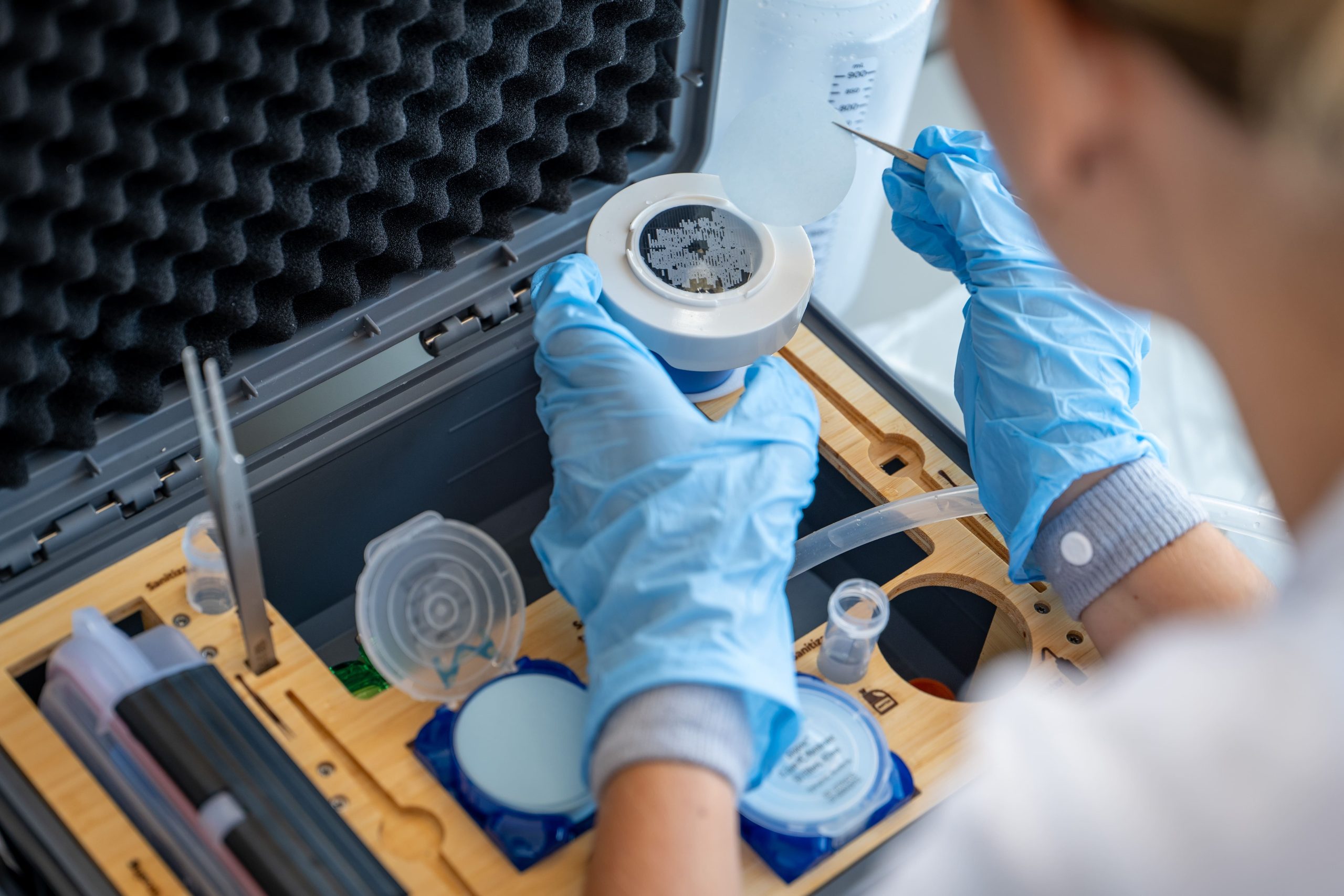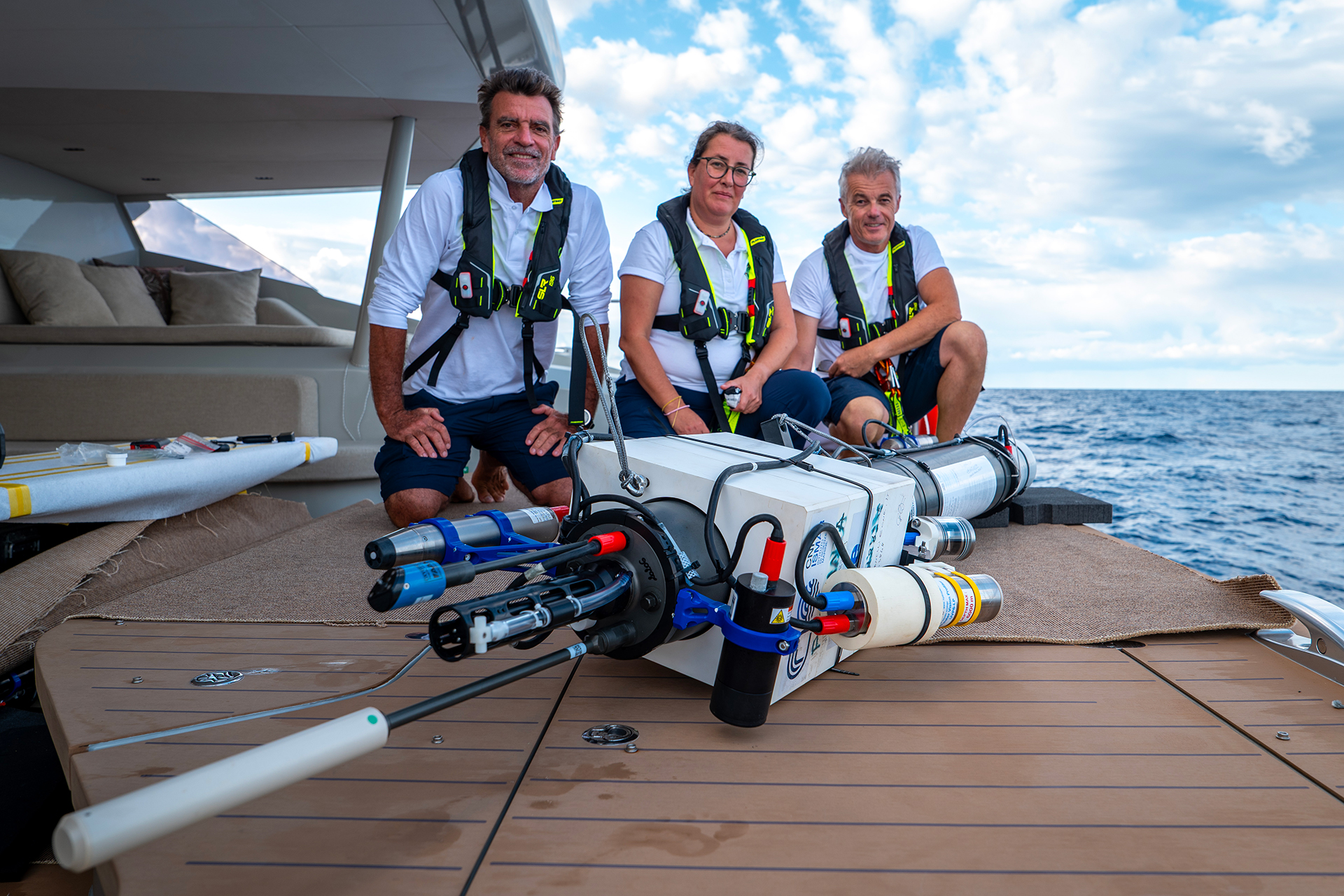Heading for Athens: ten-day crossing for MODX 70-01
From the port of Fontvieille to Athens, MODX 70-01 crossed part of the Mediterranean in ten days, punctuated by scientific protocols, the deployment of data-collection tools and high points. A look back at a voyage rich in discoveries, before the inauguration of the “Time for Action” exhibition at the Eugenides Foundation.
An active, scientific crossing
Setting sail from Monaco on September 25, MODX 70-01 headed for Greece for the first leg of its mission. During ten days of sailing, the crew and team of scientists took daily water samples to study plankton.
These samples will help us to better understand the diversity and dynamics of plankton in the Mediterranean, an essential indicator of the health of marine ecosystems. Every day, at a fixed time, the same protocol is applied: sampling, filtration and recording of data in logbooks. When the Pace satellite passed overhead, bio-optical measurements were also taken using a Hyper-Pro buoy. Finally, regular sampling of surface waters was carried out to analyze their chemical composition and optical properties.


Two BGC-Argo floats at sea
During the crossing, two BGC-Argo floats were deployed as part of the BGC-Argo-Ion project, conducted in partnership with several scientific institutions.
These autonomous floats, drifting with the currents, regularly dive to depths of 2,000 meters to measure key parameters: temperature, salinity, dissolved oxygen, pH, chlorophyll and organic carbon concentration.
The data collected will provide a better understanding of the biogeochemical functioning of the Ionian Sea and its role in climate regulation. These instruments join those of the vast international Argo network, which continuously observes the world’s oceans.
Crossing the Corinth Canal
One of the highlights of the crossing was undoubtedly the passage through the Corinth Canal, linking the Ionian and Aegean Seas.
Between its sheer cliffs, MODX 70-01 glided slowly along this spectacular six-kilometre corridor. A few hours later, the mission boat reached Athens, completing its first major navigation of the Greece mission.
Maéva Bardy
An inaugural evening at the Eugenides Foundation
Even before the boat’s arrival in the port of Piraeus, the Greek mission was already making a name for itself on land. On October 3, the Eugenides Foundation hosted the inauguration of the exhibition “Le Temps de l’Action: les Aires Marines Protégées de Méditerranée”, in the presence of Mrs. Olga Kefalogianni, Greek Minister of Tourism, Mr. Vassili Apostolopoulos, Monaco Consul in Athens, and Mr. Xavier Prache, Director of the Société des Explorations de Monaco. The exhibition highlights the wealth of Marine Protected Areas and the efforts being made to preserve them throughout the Mediterranean basin.
Throughout the mission, the Eugenides Foundation will be at the heart of the expedition: guided tours for schoolchildren and educational workshops will be organized to raise young people’s awareness of marine research and the protection of the Mediterranean.
Maéva Bardy
Stopover in Athens before departure for the Sporades
On Sunday October 5, MODX 70-01 entered the port of Athens for a brief technical stopover.
The crew took the opportunity to recharge the batteries, replenish provisions and carry out a few logistical checks before setting sail again.
This stop marked the transition between the crossing and the next phase of the mission, which will take the catamaran to the Sporades islands, in the north-western Aegean Sea, to continue its scientific explorations in the largest marine protected area in the Mediterranean.
A mission that's just beginning
After ten days at sea and a symbolic arrival in Athens, MODX 70-01 is about to embark on a new stage of exploration in the Aegean Sea.
Between science, awareness-raising and government cooperation, the journey continues – driven by the same spirit: that of exploration in the service of knowledge and protection of the oceans.